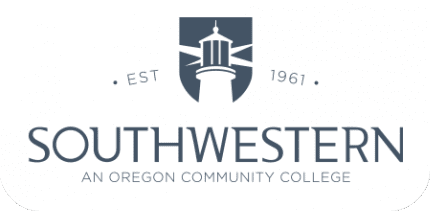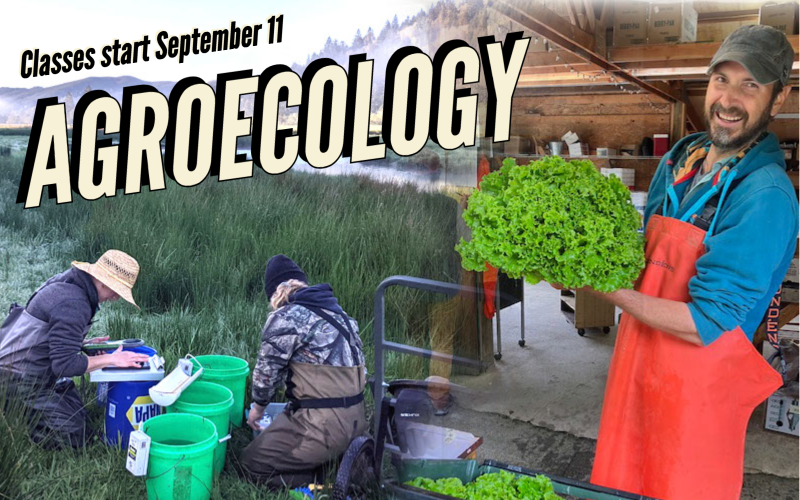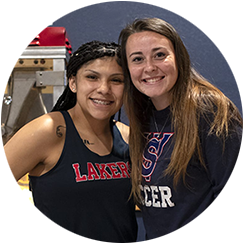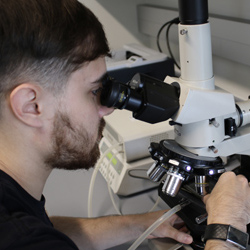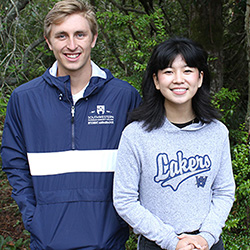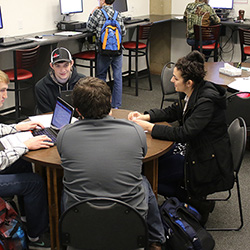It’s science. It’s agriculture. It’s ecology, sustainability, economics and sociology.
In short, Agroecology is an interdisciplinary study of the ecology of the entire food system, encompassing ecological, economic, and social dimensions. It’s a comprehensive approach to agriculture that considers not only crop production and yield, but the sustainability of the ecosystem and community.
And it’s coming to Southwestern!
Beginning fall term students can start on a path towards an Associate of Applied Science degree in Agroecology. Classes are designed for those who want to enter the workforce, as well as the region’s farmers and land managers. There will also be classes for community members. This is an exciting opportunity to delve into a holistic view of agriculture, ecosystems, and community.
All courses emphasize self-sufficiency and promote access to healthy food. Students will use the campus Instructional Garden, visit local farms, gardens, and nurseries for a hands-on, field-based experience. They’ll also have opportunities to connect with local farmers and ranchers, watershed councils, landscapers, and turf managers.
“The new Agroecology degree program at Southwestern is a remarkable new asset to our community. There are very few degree programs like it in the country. We’re thrilled the college has made this a priority and are excited about the positive impact it’s going to have on local agriculture and food systems.”
–Zoë Bradbury DeSurra, Valley Flora Farm
There are no prerequisites required to enter the program. No previous gardening or farming experience needed. The only thing students need to excel is a willingness to learn and a desire to work outdoors.
“The SWOCC Agroecology program is a necessary component to enhancing our local food systems, food acces-sibility, ecologically informed food production, and ultimately, connecting with our south coast community.”
–Micha Silvius, Myrtle Glen Farm
“This is an exciting opportunity for students looking to get a two-year degree, and for community members just looking to learn about self-sufficiency and how to successfully grow vegetables,” said Maria Farinacci, Assistant Professor who is developing the program.
“Food security and natural resource management are overlapping and important issues for people on the south coast. The local agricultural industry needs a well-trained workforce, as well as more investment, collaboration, and research to support our local growers,” Farinacci said.
REGISTER FOR THESE FALL TERM CLASSES
🌱 Agroecology I (AG 101 – 5 credits)
This first course in our degree pathway is for students looking to enter the field of agriculture, work towards becoming a farm or nursery manager or owner, become an agronomist for golf courses, or operate a landscaping business. Financial aid is available for these degree seeking students.
🍄 Fungal Ecology (NR 211 – 2 credits)
Explore the fascinating world of mushrooms!
The non-credit community education class is BOT 0221 Fungal Ecology. Credit and non-credit class meets at the same time and place.
🍅 Gardening the South Coast (AG 120 – 1 credit)
A great class for people looking to improve the success of their home garden.
The non-credit community education class is FN 0502 Gardening the South Coast. Credit and non-credit class meets at the same time and place.
Call or text 541-240-8227. Email: SWOCCbound@socc.edu
Complete list of classes and overview of the program is found here.
Instructor Maria Farinacci
You’ll find Maria Farinacci in the garden. That’s normal. But this summer her gardening has taken on a greater purpose. She’s working hard preparing Southwestern’s Instructional Garden for the arrival of students in the fall. Farinacci, Assistant Professor, Forestry/Natural Resources/Sustainable Agriculture, will be teaching the new courses for our Agroecology degree pathway.
Maria is a graduate of Ohio University with a Bachelor’s of Science in Plant Biology, with a focus on soil science and a minor in Anthropology. Since graduating college, Maria has been working in various fields related to natural resources, working on farms and ranches, teaching community mycology and mushroom cultivation courses, and more recently working for Coos Watershed Association as their Fisheries Research Assistant.
Maria has been living in Coos Bay since 2016 – up the Coos River with her husband, two dogs, and one cat. She enjoys surfing, learning about wild flora and fauna, and (of course) gardening. She is very excited for the start of the new Agroecology program, connecting with local growers, and sharing the joys of ecology and growing food with others.
